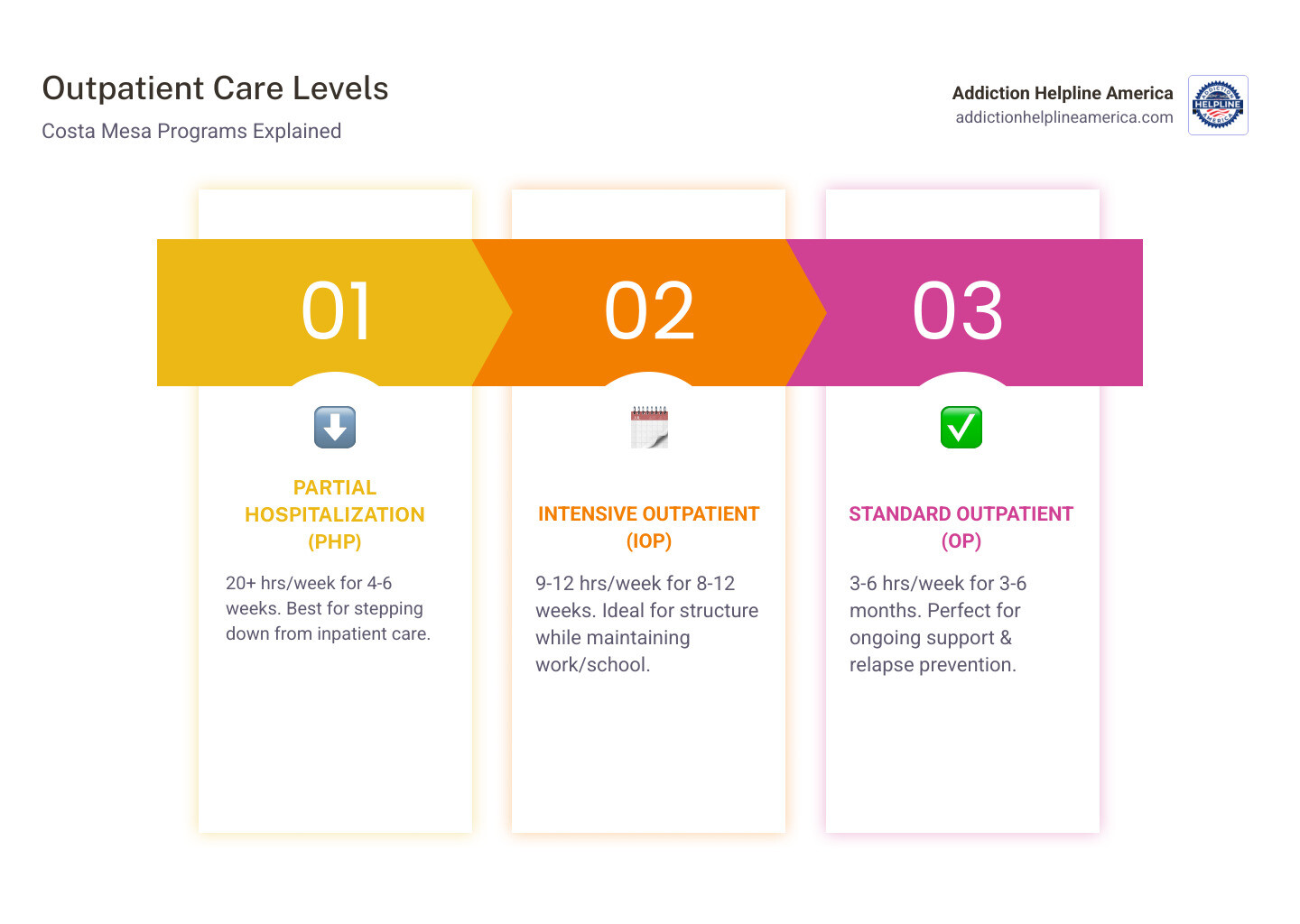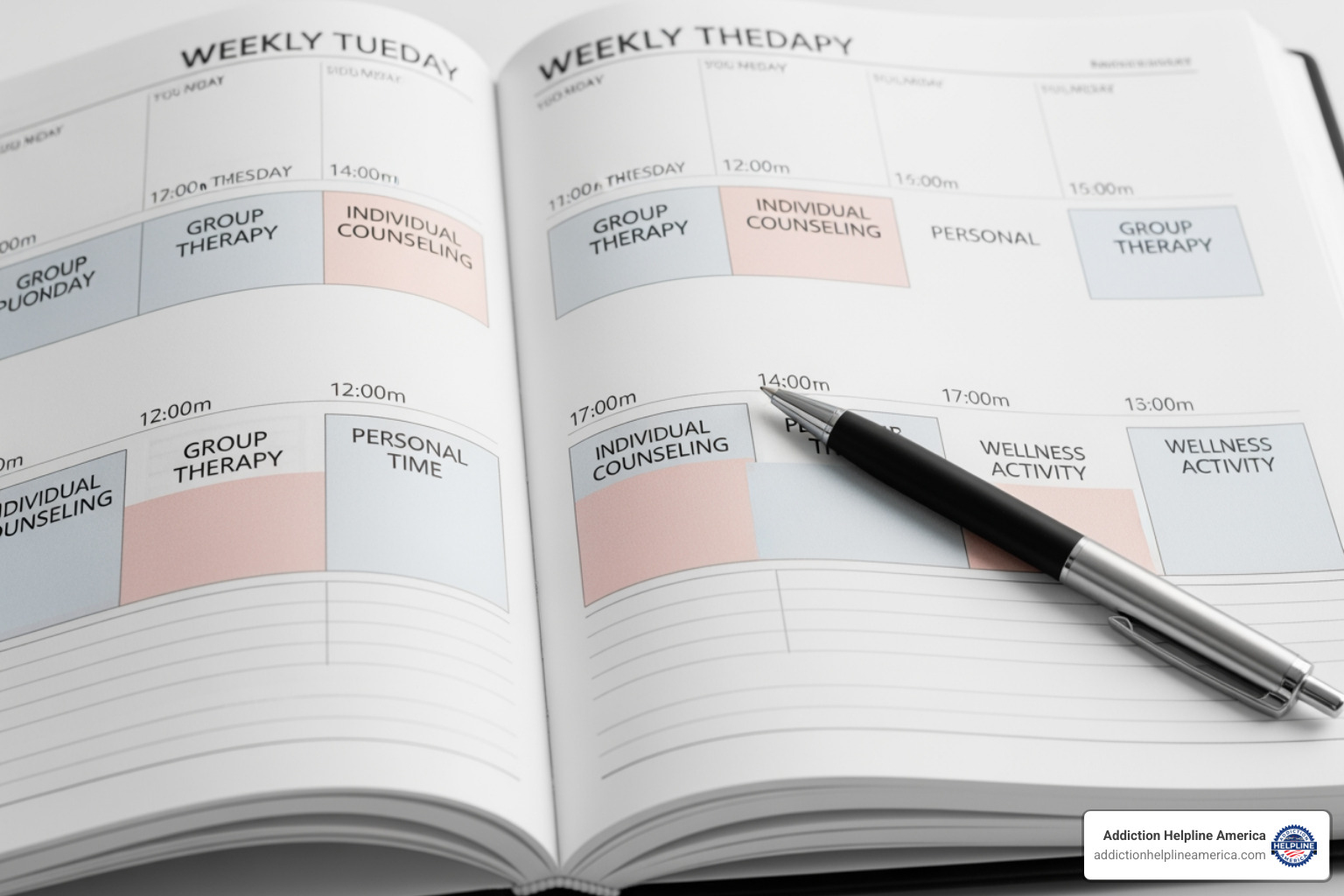
Call 24/7 Free & Confidential Helpline for Costa Mesa Outpatient Rehab
Outpatient rehab Costa Mesa offers flexible, effective addiction treatment that allows you to maintain your daily responsibilities while receiving professional support. If you’re searching for outpatient care, here’s what you need to know:
Quick Answer: Top Outpatient Rehab Options in Costa Mesa
- Best for Flexibility: Intensive Outpatient Programs (IOP) – 9-12 hours/week
- Best for Step-Down Care: Partial Hospitalization Programs (PHP) – 20+ hours/week
- Best for Ongoing Support: Standard Outpatient (OP) – 3-6 hours/week
- Key Features to Look For: State licensing, evidence-based therapies (CBT, DBT), dual diagnosis support, insurance acceptance
- Average Duration: 30-90 days, depending on individual needs
- Most Accepted Insurance: Aetna, Anthem, Cigna, United Healthcare, Blue Shield
The addiction crisis in Orange County has created an urgent need for accessible care. Outpatient rehab provides a lifeline for those who need treatment but can’t step away from work, school, or family obligations. Unlike residential programs that require you to live at a facility, outpatient care lets you attend therapy sessions while sleeping at home. You receive professional treatment—including individual counseling, group therapy, and medical support—on a flexible schedule that fits your life.
The challenge is finding the right program. Costa Mesa offers numerous outpatient facilities, but they vary in quality and approach. Without guidance, choosing can feel overwhelming.
At Addiction Helpline America, we’ve helped thousands of individuals and families steer the complex landscape of outpatient rehab Costa Mesa options. We connect them with vetted, licensed programs that match their specific needs. Our team understands that every recovery journey is unique, and we’re here to provide the confidential, compassionate guidance you need to take that crucial first step.
Know your Outpatient rehab Costa Mesa terms:
Your Guide to Choosing the Best Treatment
The statistics on addiction in Orange County represent real families and real struggles, which is why accessible treatment options like outpatient rehab Costa Mesa matter so much.
What is outpatient rehab, and how does it actually work? Think of it as structured addiction treatment that meets you where you are. Instead of moving into a facility, you attend scheduled therapy sessions, group meetings, and medical appointments while continuing to live at home. You get professional, evidence-based treatment without having to press pause on your entire life.
In contrast, inpatient programs require you to live at the facility 24/7. This immersive, controlled environment is the right choice for some, but it means stepping away completely from work, family, and your daily routine.
Outpatient care offers flexibility without sacrificing quality. You can keep your job, stay connected to your family, and learn coping skills while navigating your real-world environment. This means you’re practicing what you learn in the actual situations where you’ll need those tools. Outpatient programs also typically cost less than residential treatment because you’re not paying for room and board.
The core differences come down to where you live, how much time you commit, and your stage of recovery. Inpatient care is best for those who need to escape triggering environments or require close medical supervision. Outpatient care works well when you have a stable living situation and the motivation to stay accountable between sessions.
Neither option is inherently better. We believe in finding the right fit for your unique journey. Sometimes that means starting with inpatient care and transitioning to outpatient. Other times, outpatient treatment is the right starting point. What matters most is that you’re taking the step to get help.
Understanding the Levels of Outpatient Care in Costa Mesa
When exploring outpatient rehab Costa Mesa options, you’ll find that care exists on a spectrum, from highly structured support to more flexible, maintenance-focused treatment. This variety allows treatment to meet you exactly where you are in your recovery.
This step-down care model mirrors the natural progression of recovery. You might start with intensive support, then gradually transition to less frequent sessions as you build confidence and coping skills. This approach recognizes that recovery is a process that requires different levels of support at different stages.
Let’s break down the three main levels:
Partial Hospitalization Program (PHP) is the most intensive outpatient option, often called “day treatment.” It involves 20 or more hours of therapy per week, making it ideal for those stepping down from residential treatment or those who need significant structure but have a stable home environment.
Intensive Outpatient Program (IOP) is the middle ground, requiring about 9 to 12 hours of treatment per week. This schedule allows you to maintain work, school, or family responsibilities while receiving substantial therapeutic support. IOP is excellent for individuals who have completed PHP or for those who need more than weekly check-ins but not the intensity of PHP.
Standard Outpatient Program (OP) offers the most flexibility, with just 3 to 6 hours of treatment per week. This level is perfect for ongoing support and relapse prevention after completing a more intensive program. It serves as a safety net as you reintegrate into daily life and is a key part of a long-term aftercare plan.
Here’s how these three levels compare side-by-side:
| Feature | Partial Hospitalization Program (PHP) | Intensive Outpatient Program (IOP) | Standard Outpatient Program (OP) |
|---|---|---|---|
| Hours per Week | 20+ hours | 9-12 hours | 3-6 hours |
| Days per Week | 5-7 days | 3-5 days | 1-2 days |
| Typical Duration | 4-6 weeks | 8-12 weeks | 3-6 months (or longer) |
| Best Suited For | Stepping down from inpatient care, needing significant daily structure, medically stable but requiring intensive support | Maintaining work or school while in early recovery, solidifying coping skills, needing structure with flexibility | Long-term aftercare, relapse prevention, maintaining sobriety with minimal disruption to daily responsibilities |
The right level for you depends on your addiction severity, living situation, support system, and co-occurring conditions. These levels are designed to work together as a continuum of care. At Addiction Helpline America, we help you determine which level of care matches your current needs and connect you with vetted Costa Mesa programs that offer the right intensity for your situation.
The Top 10 Qualities to Review in an Outpatient Rehab Costa Mesa Program
Choosing the right outpatient rehab Costa Mesa program is a critical decision for your recovery. To help you steer your options, we’ve compiled a checklist of the ten most important qualities to look for in a treatment program. The best facilities will meet most of these standards.
1. Licensing and Accreditation
This is non-negotiable. Ensure the program is licensed by the State of California through the California Department of Health Care Services. Top-tier programs also earn accreditations from independent bodies like the Joint Commission (for quality and safety) and CARF (for person-centered care), and may have LegitScript certification, which demonstrates transparency and compliance.
2. Evidence-Based Therapies Offered
A quality program’s foundation should be evidence-based therapies—treatments proven by research to be effective. Key therapies include:
- Cognitive-Behavioral Therapy (CBT): Helps you identify and change negative thought patterns that lead to substance use.
- Dialectical Behavior Therapy (DBT): Focuses on emotional regulation, distress tolerance, and mindfulness.
- Motivational Interviewing: A counseling style that helps you find your own internal motivation for change.
- Trauma-Informed Care: An approach that recognizes and addresses the impact of past trauma on addiction.
Look for programs offering a mix of individual, group, and family therapy.
3. Dual Diagnosis and Mental Health Support
Over half of people with addiction also have a co-occurring mental health condition like anxiety, depression, or PTSD. This is called a dual diagnosis. Treating the addiction without addressing the underlying mental health issue is ineffective. Look for programs with integrated treatment and on-site psychiatric services to manage both conditions simultaneously.
4. Specialized Outpatient Rehab in Costa Mesa
Your recovery needs are unique, and specialized programs can provide targeted support. Consider programs designed for specific groups, such as first responders, professionals, young adults, men, or women. LGBTQ+ affirming care is also crucial for creating a safe, culturally competent environment.
5. Holistic and Complementary Services
Recovery involves healing the whole person—mind, body, and spirit. Holistic services complement traditional therapy and support this process. Look for offerings like yoga, meditation, mindfulness training, art or music therapy, and nutrition counseling. These services help reduce stress and improve overall well-being.
6. Staff Credentials and Experience
The quality of your care team is paramount. A strong team includes licensed therapists (LCSWs, LMFTs), certified addiction counselors (CADCs), and medical doctors (MDs). Experienced staff, including those with personal recovery experience, bring valuable wisdom and empathy. Also, inquire about the staff-to-patient ratio—a lower ratio means more personalized attention.
7. Medication-Assisted Treatment (MAT)
For opioid or alcohol addiction, Medication-Assisted Treatment (MAT) can be a game-changer. MAT combines FDA-approved medications like Buprenorphine (Suboxone) or Naltrexone with counseling. These medications reduce cravings and withdrawal symptoms, giving your brain time to heal while you develop coping skills.
8. Aftercare and Relapse Prevention Planning
Recovery is a lifelong journey that continues after treatment ends. A quality program emphasizes a continuum of care and prepares you for success. This includes creating a personalized relapse prevention plan, connecting you with alumni programs, and recommending sober living arrangements or ongoing support groups (like 12-step programs).
9. Facility Environment and Location
The treatment environment should feel safe, comfortable, and conducive to healing. The facility’s location in Costa Mesa offers access to a strong recovery community and sober resources. Ensure the center is accessible from your home or work to maintain consistent attendance.
10. Personalized Treatment Planning
The best programs understand you are an individual, not a diagnosis. Personalized treatment planning begins with a thorough assessment of your history, health, and goals. Your plan should be reviewed and adjusted regularly, and you should be an active participant in setting goals. This collaborative approach empowers you and leads to better long-term outcomes.
At Addiction Helpline America, we help you find programs that meet these essential criteria, ensuring you get the quality care you deserve.
Navigating Cost, Insurance, and Program Duration
Understanding the financial and time commitments of rehab is a crucial step. We know you have questions like, “Can I afford this?” and “How long will it take?” Let’s break down the answers.
How Much Does Outpatient Rehab in Costa Mesa Cost?
The cost of outpatient rehab Costa Mesa varies based on the level of care (PHP, IOP, or OP), program duration, and specific services offered. For those paying without insurance, many facilities offer private pay options and flexible payment plans.
The good news is that most major insurance providers cover addiction treatment. Whether you have a PPO or HMO plan from carriers like Aetna, Anthem, Cigna, United Healthcare, or Blue Shield, your policy likely includes benefits for outpatient rehab.
The key is to understand if a facility is in-network (lower cost) or out-of-network (higher cost) with your plan. Verifying these benefits can be confusing, but it’s essential.
This is where we come in. At Addiction Helpline America, we offer free, confidential insurance benefit verification. We’ll contact your provider for you, determine your coverage, and explain it in simple terms so you know your options before making a decision.
What is the Typical Duration of Treatment?
There is no one-size-fits-all timeline for recovery. Program length is custom to your individual needs, progress, and circumstances. While many programs are structured around 30, 60, or 90-day models, the right duration depends on factors like addiction severity and co-occurring conditions.
Many outpatient rehab Costa Mesa programs use a phase-based progression model. You might start in a more intensive program (like PHP) and “step down” to IOP and then standard OP as you gain stability and skills. This gradual approach is designed to build a strong foundation for long-term recovery, not just to get you through a program quickly. The goal is to set you up for a life of lasting sobriety.
What to Expect: A Day in Treatment and Long-Term Support
Starting outpatient rehab Costa Mesa is less intimidating when you know what to expect. Understanding the daily structure can ease anxiety and show how recovery can fit into your life.
A Typical Day in an Outpatient Program
While your schedule will depend on the program’s intensity (PHP, IOP, or OP), a typical day includes a blend of structured activities. These often begin with morning check-ins to set intentions for the day.
The core of the program is group therapy, an interactive setting where you share experiences and learn from peers on a similar path. You’ll also have scheduled individual counseling sessions with a primary therapist to work on personal challenges and track your progress.
Educational workshops cover essential topics like the science of addiction, relapse prevention, and stress management. The beauty of outpatient care is its flexibility, with many programs offering evening or weekend sessions to accommodate work, school, or family responsibilities.
How Outpatient Rehab Supports Long-Term Sobriety
Recovery is about building a new way of life, and outpatient treatment is designed to help you do just that. The process focuses on several key areas:
- Building Coping Skills: You’ll learn practical, real-world strategies to manage stress, cravings, and triggers in your daily environment.
- Community Integration and Support: Because you live at home, you apply what you learn in real time. Programs help you connect with the local recovery community, peer support groups, and sober social activities. This accountability structure and peer network become an invaluable safety net.
- Gradual Transition to Independence: Outpatient care allows you to build confidence and self-trust step-by-step. You’re not suddenly released from 24/7 care; instead, you take on more responsibility as you become ready, equipped with the tools and support for lasting recovery.
Frequently Asked Questions about Outpatient Rehab
We hear these questions every day from people exploring their options. Here are straightforward answers to some of the most common concerns about outpatient rehab Costa Mesa.
How do I know if outpatient rehab is right for me?
Outpatient rehab is highly effective for many, but it’s not a universal fit. It tends to work best if you have:
- A stable and supportive living environment, free from active substance use.
- A strong support system of family or friends who encourage your recovery.
- A high level of motivation to engage in treatment and stay accountable.
- Work, school, or family responsibilities that you cannot leave.
If you’re dealing with a severe, long-standing addiction or lack a safe home environment, a higher level of care like inpatient treatment may be a better starting point before stepping down to an outpatient program.
Can I keep working while attending an outpatient program?
Yes. This is one of the primary benefits of outpatient treatment. Programs are designed with the understanding that life continues during recovery. Most facilities offer flexible scheduling, including evening and weekend sessions, to accommodate work and school schedules. For job protection, programs can often assist with paperwork for the Family and Medical Leave Act (FMLA), which allows you to take medical leave to address a health condition like addiction.
What is the difference between therapy and an outpatient rehab program?
Think of therapy as one important component of a larger, more comprehensive program. While individual or group therapy focuses on specific psychological issues, an outpatient rehab program is a structured, multi-faceted treatment plan. It combines several key services:
- Intensity and Structure: Rehab programs involve more hours per week (from 3 to 20+) with a clear schedule and goals.
- Comprehensive Services: They integrate individual and group therapy with educational workshops, skills training, and sometimes medical oversight.
- Peer Community: You become part of a community of people who understand your struggles and successes, providing a unique and powerful form of support that is central to the rehab experience.
In short, therapy is like working with a specialist, while a rehab program is like a complete wellness center focused on every aspect of your recovery.
Find the Right Costa Mesa Rehab for You
Your recovery journey deserves the right support from the start. The best outpatient rehab Costa Mesa program will be licensed and accredited, use evidence-based therapies, offer dual diagnosis support, and provide personalized care that puts you at the center of your recovery.
We understand that taking this first step is daunting. You are not alone in your concerns, and recovery is possible. Thousands of people have found lasting sobriety through the right outpatient program, and you can too.
At Addiction Helpline America, our mission is to provide free, confidential, and personalized guidance. We connect individuals and families with vetted, licensed programs that fit their specific needs. Whether you need help verifying insurance, understanding your options, or just talking to someone who cares, our team is here for you.
You don’t have to figure this out alone. Let us help you find the right program and take that crucial first step with confidence.
Our helpline is 100%
free & confidential
If you or someone you care about is struggling with drug or alcohol addiction, we can help you explore your recovery options. Don’t face this challenge alone—seek support from us.
Programs
Resources
Will my insurance
cover addiction
treatment?
We're ready to help
Find the best
drug or alcohol treatment
center
Are you or a loved one struggling with addiction? Call today to speak to a treatment expert.
















